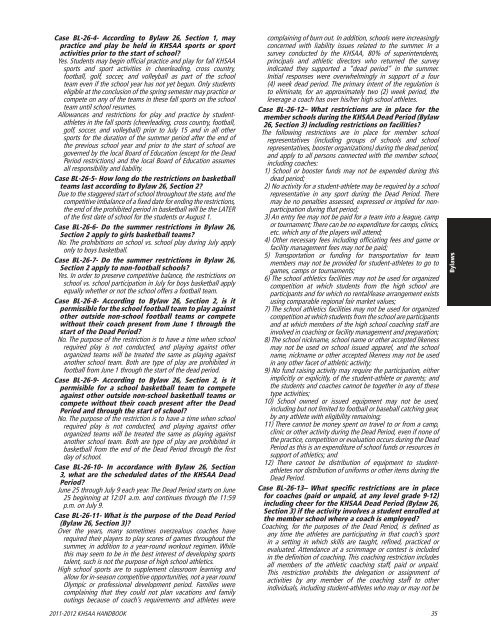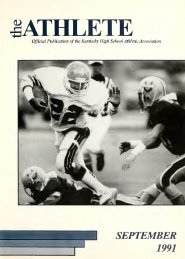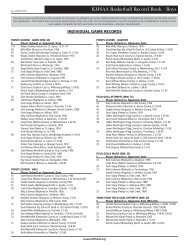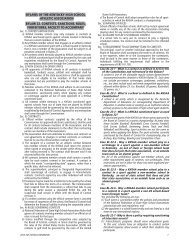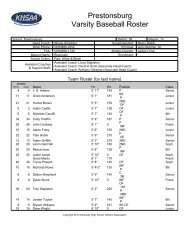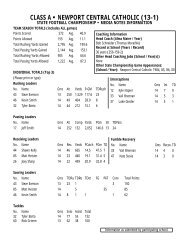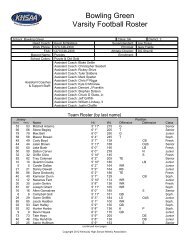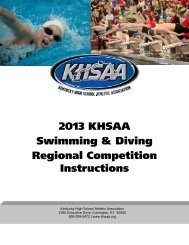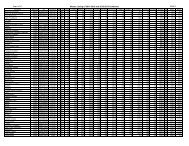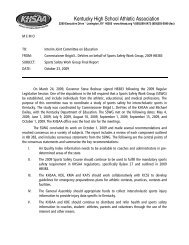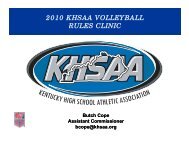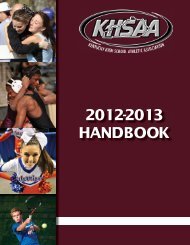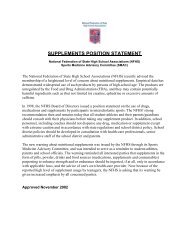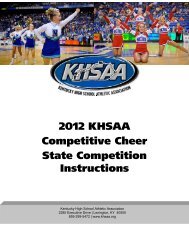20112012 Handbook - Kentucky High School Athletic Association
20112012 Handbook - Kentucky High School Athletic Association
20112012 Handbook - Kentucky High School Athletic Association
You also want an ePaper? Increase the reach of your titles
YUMPU automatically turns print PDFs into web optimized ePapers that Google loves.
Case BL-26-4- According to Bylaw 26, Section 1, may<br />
practice and play be held in KHSAA sports or sport<br />
activities prior to the start of school?<br />
Yes. Students may begin offi cial practice and play for fall KHSAA<br />
sports and sport activities in cheerleading, cross country,<br />
football, golf, soccer, and volleyball as part of the school<br />
team even if the school year has not yet begun. Only students<br />
eligible at the conclusion of the spring semester may practice or<br />
compete on any of the teams in these fall sports on the school<br />
team until school resumes.<br />
Allowances and restrictions for play and practice by studentathletes<br />
in the fall sports (cheerleading, cross country, football,<br />
golf, soccer, and volleyball) prior to July 15 and in all other<br />
sports for the duration of the summer period after the end of<br />
the previous school year and prior to the start of school are<br />
governed by the local Board of Education (except for the Dead<br />
Period restrictions) and the local Board of Education assumes<br />
all responsibility and liability.<br />
Case BL-26-5- How long do the restrictions on basketball<br />
teams last according to Bylaw 26, Section 2?<br />
Due to the staggered start of school throughout the state, and the<br />
competitive imbalance of a fi xed date for ending the restrictions,<br />
the end of the prohibited period in basketball will be the LATER<br />
of the fi rst date of school for the students or August 1.<br />
Case BL-26-6- Do the summer restrictions in Bylaw 26,<br />
Section 2 apply to girls basketball teams?<br />
No. The prohibitions on school vs. school play during July apply<br />
only to boys basketball.<br />
Case BL-26-7- Do the summer restrictions in Bylaw 26,<br />
Section 2 apply to non-football schools?<br />
Yes. In order to preserve competitive balance, the restrictions on<br />
school vs. school participation in July for boys basketball apply<br />
equally whether or not the school offers a football team.<br />
Case BL-26-8- According to Bylaw 26, Section 2, is it<br />
permissible for the school football team to play against<br />
other outside non-school football teams or compete<br />
without their coach present from June 1 through the<br />
start of the Dead Period?<br />
No. The purpose of the restriction is to have a time when school<br />
required play is not conducted, and playing against other<br />
organized teams will be treated the same as playing against<br />
another school team. Both are type of play are prohibited in<br />
football from June 1 through the start of the dead period.<br />
Case BL-26-9- According to Bylaw 26, Section 2, is it<br />
permisible for a school basketball team to compete<br />
against other outside non-school basketball teams or<br />
compete without their coach present after the Dead<br />
Period and through the start of school?<br />
No. The purpose of the restriction is to have a time when school<br />
required play is not conducted, and playing against other<br />
organized teams will be treated the same as playing against<br />
another school team. Both are type of play are prohibited in<br />
basketball from the end of the Dead Period through the fi rst<br />
day of school.<br />
Case BL-26-10- In accordance with Bylaw 26, Section<br />
3, what are the scheduled dates of the KHSAA Dead<br />
Period?<br />
June 25 through July 9 each year. The Dead Period starts on June<br />
25 beginning at 12:01 a.m. and continues through the 11:59<br />
p.m. on July 9.<br />
Case BL-26-11- What is the purpose of the Dead Period<br />
(Bylaw 26, Section 3)?<br />
Over the years, many sometimes overzealous coaches have<br />
required their players to play scores of games throughout the<br />
summer, in addition to a year-round workout regimen. While<br />
this may seem to be in the best interest of developing sports<br />
talent, such is not the purpose of high school athletics.<br />
<strong>High</strong> school sports are to supplement classroom learning and<br />
allow for in-season competitive opportunities, not a year round<br />
Olympic or professional development period. Families were<br />
complaining that they could not plan vacations and family<br />
outings because of coach’s requirements and athletes were<br />
complaining of burn out. In addition, schools were increasingly<br />
concerned with liability issues related to the summer. In a<br />
survey conducted by the KHSAA, 80% of superintendents,<br />
principals and athletic directors who returned the survey<br />
indicated they supported a “dead period” in the summer.<br />
Initial responses were overwhelmingly in support of a four<br />
(4) week dead period. The primary intent of the regulation is<br />
to eliminate, for an approximately two (2) week period, the<br />
leverage a coach has over his/her high school athletes.<br />
Case BL-26-12– What restrictions are in place for the<br />
member schools during the KHSAA Dead Period (Bylaw<br />
26, Section 3) including restrictions on facilities?<br />
The following restrictions are in place for member school<br />
representatives (including groups of schools and school<br />
representatives, booster organizations) during the dead period,<br />
and apply to all persons connected with the member school,<br />
including coaches:<br />
1) <strong>School</strong> or booster funds may not be expended during this<br />
dead period;<br />
2) No activity for a student-athlete may be required by a school<br />
representative in any sport during the Dead Period. There<br />
may be no penalties assessed, expressed or implied for nonparticipation<br />
during that period;<br />
3) An entry fee may not be paid for a team into a league, camp<br />
or tournament; There can be no expenditure for camps, clinics,<br />
etc. which any of the players will attend;<br />
4) Other necessary fees including offi ciating fees and game or<br />
facility management fees may not be paid;<br />
5) Transportation or funding for transportation for team<br />
members may not be provided for student-athletes to go to<br />
games, camps or tournaments;<br />
6) The school athletics facilities may not be used for organized<br />
competition at which students from the high school are<br />
participants and for which no rental/lease arrangement exists<br />
using comparable regional fair market values;<br />
7) The school athletics facilities may not be used for organized<br />
competition at which students from the school are participants<br />
and at which members of the high school coaching staff are<br />
involved in coaching or facility management and preparation;<br />
8) The school nickname, school name or other accepted likeness<br />
may not be used on school issued apparel, and the school<br />
name, nickname or other accepted likeness may not be used<br />
in any other facet of athletic activity;<br />
9) No fund raising activity may require the participation, either<br />
implicitly or explicitly, of the student-athlete or parents; and<br />
the students and coaches cannot be together in any of these<br />
type activities;<br />
10) <strong>School</strong> owned or issued equipment may not be used,<br />
including but not limited to football or baseball catching gear,<br />
by any athlete with eligibility remaining;<br />
11) There cannot be money spent on travel to or from a camp,<br />
clinic or other activity during the Dead Period, even if none of<br />
the practice, competition or evaluation occurs during the Dead<br />
Period as this is an expenditure of school funds or resources in<br />
support of athletics; and<br />
12) There cannot be distribution of equipment to studentathletes<br />
nor distribution of uniforms or other items during the<br />
Dead Period.<br />
Case BL-26-13– What specifi c restrictions are in place<br />
for coaches (paid or unpaid, at any level grade 9-12)<br />
including cheer for the KHSAA Dead Period (Bylaw 26,<br />
Section 3) if the activity involves a student enrolled at<br />
the member school where a coach is employed?<br />
Coaching, for the purposes of the Dead Period, is defi ned as<br />
any time the athletes are participating in that coach’s sport<br />
in a setting in which skills are taught, refi ned, practiced or<br />
evaluated. Attendance at a scrimmage or contest is included<br />
in the defi nition of coaching. This coaching restriction includes<br />
all members of the athletic coaching staff, paid or unpaid.<br />
This restriction prohibits the delegation or assignment of<br />
activities by any member of the coaching staff to other<br />
individuals, including student-athletes who may or may not be<br />
2011-2012 KHSAA HANDBOOK 35<br />
Bylaws Bylaws


